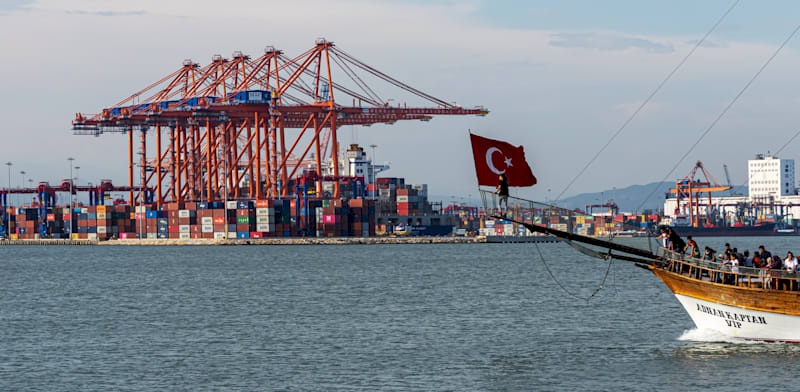
Turkey Tightens Maritime Blockade on Israel.. Refusal to Dock an Israeli Ship in Istanbul
SadaNews Economy Translation – The Hebrew newspaper "Globes", specialized in economics, reported that Turkish authorities refused last Friday to allow a ship belonging to the Israeli company "Zim" to dock at Istanbul port, following new Turkish anti-Israel measures, revealing that major international shipping companies such as MSC and Maersk are still awaiting clear instructions from the authorities in Ankara, with some describing this measure as a direct targeting of the "Zim" company.
According to informed Israeli and Turkish sources, the Turkish ports authority declined to permit the "Zim" ship to dock because it is owned by Israel, forcing the vessel to head to the port of "Piraeus" in Greece, which halted all shipments of "Zim" directed to and from Turkish ports, with no alternative solutions available at the moment, according to SadaNews Economy Translation.
"Any Relation with Israel is Prohibited"
The newspaper "Globes" quoted a Turkish source saying that "there is still a state of anticipation in the international shipping sector awaiting clear instructions from Ankara," confirming that "any relation with Israel is prohibited", including loading goods directed to the Palestinian Authority, according to SadaNews Economy Translation.
The newspaper added: "While ships belonging to Zim are considered directly and clearly associated with Israel, major other shipping companies like MSC and Maersk are still awaiting official directives, as it has become clear that the flag raised by the ship does not guarantee anything against the new Turkish policy," and an Israeli source stated: "This is a step aimed directly at liquidating Zim".
New Escalation in Turkish Measures Against Israel
"Globes" also revealed on Thursday that Turkey decided to expand its measures and completely halt Turkish ships' movement to Israel, about a year and three months after it imposed a trade ban on Israel.
According to the new instructions, any ship flying the Israeli flag or owned by Israeli companies is now prohibited from docking at Turkish ports, and in turn, Turkish ships are barred from docking at Israeli ports, as SadaNews Economy Translation reported.
The new instructions also include a ban on handling shipments directed to Israel, although this step has little practical impact, as there is no need for a shipment from Greece to Haifa to pass through Turkey.
Ankara has also directed all Turkish ports to ask ship owners to sign a pledge stating that there is no relation between their ships and Israel, and that they are not carrying military shipments or otherwise to Israel.
Another Blow to Zim Company
The newspaper clarified that this step is an additional blow to the "Zim" company, which is already going through a tough period, as the company announced last week disappointing quarterly financial results for investors, noting that net profit in the second quarter fell by 94% to only $24 million, after the company recorded revenue growth and net profits amounting to $296 million in the first quarter.
According to the newspaper, "Zim" has not yet commented on the event.
Imports from Turkey Reached $5.3 Billion Annually
This Turkish measure comes amid a report from the Bank of Israel from March, which indicated that Turkey has been an important source of imports for Israel over the past 15 years. In 2023, the value of imports from Turkey was about $5.3 billion, accounting for about 6.3% of Israel's total imports, of which $4.6 billion was imported directly from Turkey, the rest via third parties.
Turkey is a major source of construction and production materials for Israel, as about half of cement and gypsum imports and their products, and nearly one-fifth of iron and steel imports come from Turkey. Israel has also imported large quantities of plastics, cars, and electronic equipment from Turkey, as the "Globes" newspaper indicated.
In contrast, the volume of Israeli exports to Turkey has been limited, amounting to about $1.5 billion in 2023, or about 2.5% of total exports, focusing on chemicals, plastics, and metal and steel scrap, while the export of services and the number of Turkish tourists to Israel were minimal, resulting in a clear trade deficit in the trade balance between the two countries.
Since the imposition of the ban in May, Israeli exports to Turkey have decreased by about $1 billion compared to 2023, contributing to a decline in total exports of chemical products during 2024, while its impact in other sectors has been limited.
Imports of Turkish products dropped from about $550 million monthly at the beginning of 2024 to about $100–200 million monthly at its end, with a noticeable decline in most main categories of goods.

The Trap of High Prices: Debts Haunt Germans and Bankruptcy Knocks at Their Doors

Major Changes in the Saudi Public Investment Fund… What is Happening?

Gold Stabilizes and Heads for its Seventh Consecutive Monthly Gain

The IMF Disburses Approximately $2.3 Billion to Egypt Following Two Reviews of the "Reform...

Oil Rises Amid Expectations for Nuclear Negotiations Between Washington and Tehran

Gold prices near $5187 per ounce as tensions escalate

How Will Oil Be Affected If Tensions Between Washington and Tehran Escalate?
